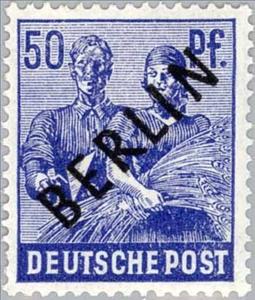Stamp: Bricklayer and farmer lady (Berlin 1948)
Bricklayer and farmer lady (Berlin 1948)
03 September (Berlin ) within release 2nd Control Board issue, black overprint goes into circulation Stamp Bricklayer and farmer lady face value 50 German pfennig
| Stamp Bricklayer and farmer lady in catalogues | |
|---|---|
| Michel: | Mi:DE-BE 13 |
| Yvert et Tellier: | Yt:DE-BE 13A |
Stamp is square format.
Also in the issue 2nd Control Board issue, black overprint:
- Stamp - Planter face value 2;
- Stamp - Planter face value 6;
- Stamp - Planter face value 6;
- Stamp - Planter face value 6;
- Stamp - Sower face value 8;
- Stamp - Sower face value 8;
- Stamp - Sower face value 10;
- Stamp - Sower face value 10;
- Stamp - Worker face value 12;
- Stamp - Worker face value 12;
- Stamp - Worker face value 12;
- Stamp - Planter face value 15;
- Stamp - Bricklayer and farmer lady face value 16;
- Stamp - Sower face value 20;
- Stamp - Bricklayer and farmer lady face value 24;
- Stamp - Bricklayer and farmer lady face value 24;
- Stamp - Planter face value 25;
- Stamp - Worker face value 30;
- Stamp - Sower face value 40;
- Stamp - Bricklayer and farmer lady face value 50;
- Stamp - Worker face value 60;
- Stamp - Worker face value 80;
- Stamp - Bricklayer and farmer lady face value 84;
- Stamp - Peace dove over unfettered hands face value 1;
- Stamp - Peace dove over unfettered hands face value 2;
- Stamp - Peace dove over unfettered hands face value 3;
- Stamp - Peace dove over unfettered hands face value 5;
- Stamp - Bricklayer and farmer lady face value 16;
- Stamp - Sower face value 20;
- Stamp - Sower face value 10;
- Stamp - Worker face value 12;
- Stamp - Bricklayer and farmer lady face value 16;
- Stamp - Bricklayer and farmer lady face value 50;
- Stamp - Planter face value 25;
- Stamp - Planter face value 25;
- Stamp - Sower face value 10;
- Stamp with Attached Label - Sower face value 10;
- Se-tenant - Worker face value 2*12;
- Stamp with Collectible Margin - Sower face value 10;
- Stamp with Collectible Margin - Sower face value 10;
- Stamp with Collectible Margin - Sower face value 10;
- Stamp with Collectible Margin - Sower face value 10;
- Stamp - Sower face value 10;
- Stamp - Sower face value 10;
- Stamp - Sower face value 10;
- Stamp - Sower face value 10;
- Stamp - Sower face value 10;
- Stamp with Collectible Margin - Sower face value 10;
Stamp Bricklayer and farmer lady it reflects the thematic directions:
Agriculture is the cultivation and breeding of animals, plants and fungi for food, fiber, biofuel, medicinal plants and other products used to sustain and enhance human life.[1] Agriculture was the key development in the rise of sedentary human civilization, whereby farming of domesticated species created food surpluses that nurtured the development of civilization. The study of agriculture is known as agricultural science. The history of agriculture dates back thousands of years, and its development has been driven and defined by greatly different climates, cultures, and technologies. Industrial agriculture based on large-scale monoculture farming has become the dominant agricultural methodology.
A profession is a field of work that has been successfully professionalized. It can be defined as a disciplined group of individuals, professionals, who adhere to ethical standards and who hold themselves out as, and are accepted by the public as possessing special knowledge and skills in a widely recognised body of learning derived from research, education and training at a high level, and who are prepared to apply this knowledge and exercise these skills in the interest of others
A craft or trade is a pastime or an occupation that requires particular skills and knowledge of skilled work. In a historical sense, particularly the Middle Ages and earlier, the term is usually applied to people occupied in small scale production of goods, or their maintenance, for example by tinkers. The traditional term craftsman is nowadays often replaced by artisan and by craftsperson.



